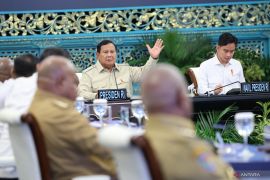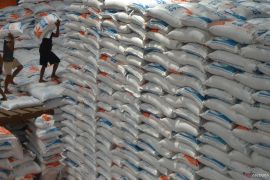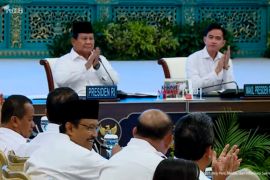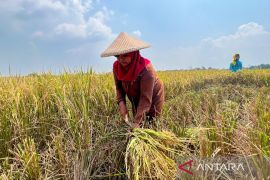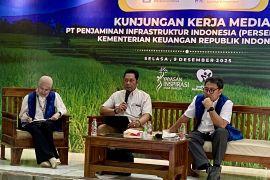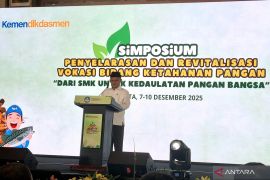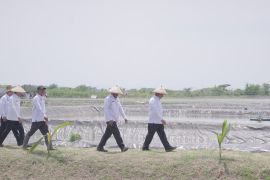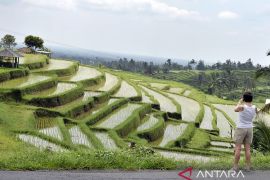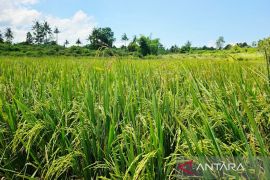In addition to the promotion of diversifying the nation�s foods, the public should also realize they have many other staple foods, such as cassava, corn, sagu and tubers, in place of rice, to assure their food security.
Law No.7/1996 defined food security as a condition when all people in households have sufficient food at all times, represented as sufficient quantities and quality of food in safe and achievable conditions.
According to Indonesian Institute of Sciences (LIPI) Chairman Lukman Hakim, sufficient quantities of food that are edible for all people is the foundation of food security, prosperity, health and the intelligence of the nation.
But in his press statement early this week, Lukman said a number of studies showed that although there was sufficient food availability at the national level, it did not necessarily ensure food security at the regional, household, and individual levels.
According to Lukman, food might be available in an area, but not accessible to certain households if they cannot acquire a sufficient quantity or diversity of food.
"Limited food accessibility will result in difficulty in obtaining sufficient quality and nutritious food, and thus it will hamper the continuity of food security," he said.
Meanwhile, Research and Technology Minister Gusti Muhammad Hatta said here on Tuesday that the promotion of locally-produced food in a staple diet was crucial in order to reduce people`s dependency on rice.
"In the past, we were familiar with various traditional staple foods, such as sago, corn and tubers, but I don`t know why people gradually switched to rice," he said here on Tuesday.
Gusti urged all Indonesians to return to consuming local produce as staple foods, instead of relying heavily on rice.
Speaking to the press after opening the 10th National Workshop on Food and Nutrition, he said the nation`s food diversification goals would not be met by importing more rice, but by replacing rice with locally-grown traditional staple foods.
"Importing food will not solve the problem of food security," Gusti pointed out.
Efforts to achieve food self-sufficiency for Indonesia are still facing many challenges, such as population growth, climate change, and conversion of agricultural land into housing plots, he stated.
"Therefore, we are taking a number of steps to tackle such issues. We are developing superior-quality seeds to increase productivity. We are also encouraging the cultivation of sorghum, an important crop for food security," Gusti added.
On various occasions President Susilo Bambang Yudhoyono has said the food diversification programme, aimed at reducing the Indonesian people`s dependence upon rice, should continue to be promoted.
He also said research on alternative foods must continue in the nation's laboratories.
According to the president, studies on alternative food sources have been ongoing for years, but the results were only seen at industry exhibitions.
This might explain why some experts said little progress had been made with regard to implementation of the food diversification programme and why it remains difficult for most Indonesians to change their diets, which have been centered around rice.
Health Minister Nafsiah Mboi has noted that many people turned to rice as their staple food because of social factors.
"People in East Nusa Tenggara (NTT), for example, used to consume local foods, such as corn, tubers, and bananas, but now they are no longer considered to be staple foods," Nafsiah said.
She pointed out that the nutrition found in corn was not even worse than rice.
Meanwhile, Leta Rafael Levis, an agribusiness observer from the University of Nusa Cendana (Undana) in East Nusa Tenggara, said in Kupang recently that corn and tubers were still not considered staple foods because people fear they would be going against global trends by consuming them as their main foods.
"People think the world would consider them to be backwards or famine-stricken if they make locally produced food part of their staple diet," Rafael explained.
The Undana lecturer pointed out that locally produced food products were not consumed as staple foods in any NTT district or elsewhere.
Therefore, the Ministry of Agriculture continues to promote food diversification programs in an effort to reduce the public`s dependence upon rice and to motivate consumers to switch to locally grown produce, such as corn, cassava, bananas, nuts and others.
Further, Indonesia is striving to increase production of food and other agricultural commodities through the national food security action plan 2010-2015, seeking to become self-sufficient by 2015.
At the national level, the government has set four major agricultural targets, including sustaining its self-sufficiency in the production of major food crops, food diversification, increasing added value to food production, and raising the living standards of farmers. (*)
Reporter: Otniel Tamindael
Editor: Otniel Tamindael
Copyright © ANTARA 2012

